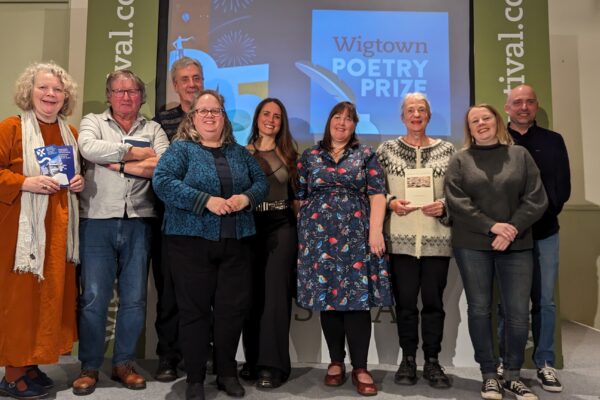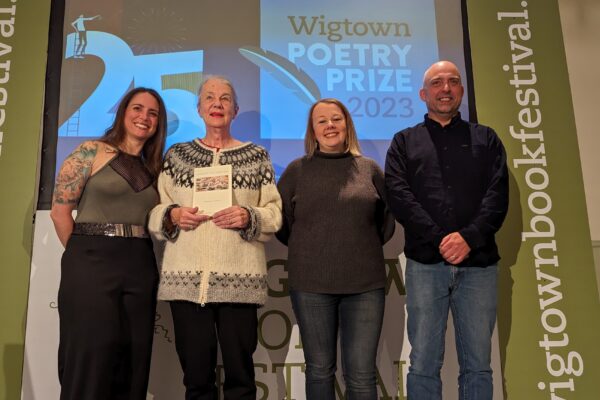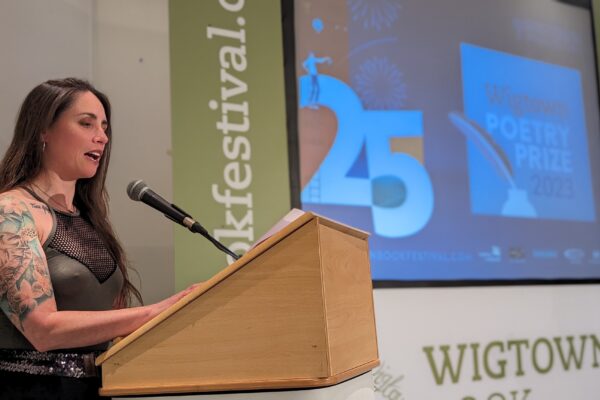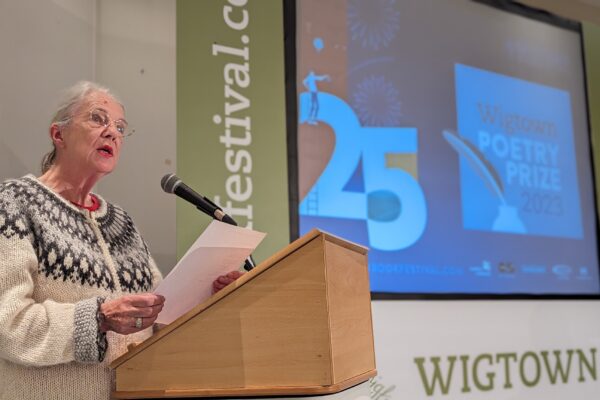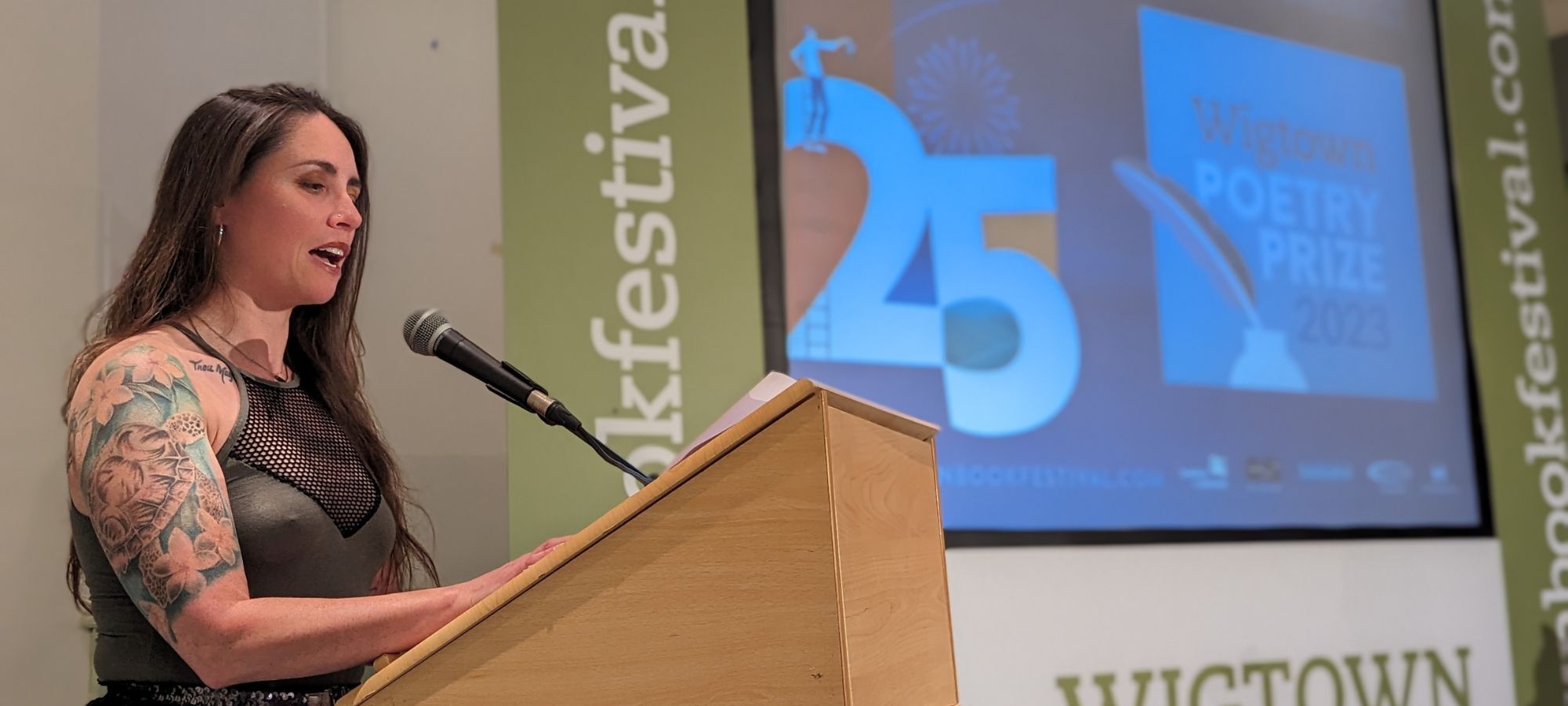
Wigtown Poetry Prize Winners 2023
30/09/23
Wigtown Poetry Prize Winners Revealed
- International awards celebrate Scotland’s three Indigenous languages
- Winners unveiled at special Wigtown Book Festival event
The winners have been unveiled for the annual Wigtown Poetry Prize – Scotland’s international poetry awards which celebrate the country’s three indigenous languages.
Yesterday’s awards ceremony, in the County Buildings, Wigtown, was hosted by poet and author Hugh McMillan as part of the Wigtown Book Festival.
Hugh said: “The Wigtown prizes in English, Scots and Gaelic are among the most eagerly sought-after accolades and the list of judges and winners read like a who’s who of contemporary poetry’.”
The awards attract entries from around the world – nurturing poetry and providing a showcase for poets.
Nicholas Walker, Wigtown Poetry Prize Group Chair, said: “The festival is committed to supporting Scotland's indigenous languages and promoting poetry alongside other literary forms. We are delighted that this year's prize attracted over 600 entries, from Scotland, England and as far afield as France, Canada, Japan and New Zealand.
“We are grateful to the Gaelic Books Council and the Saltire Society for their support of the prize, and to this year's judges for their essential contribution. We congratulate all short-listed entrants and this year's winners in particular.”
The Wigtown Prize
Open to work in English, Scots or Scottish Gaelic. The winner receives £1,500 and the runner-up £200.
- Winner: My Mother Unwraps My Gift of Frida Kahlo’s Me and My Parrots, by John Wheway
- Runner up: Winter Solstice, Rachel Rankin
Donald S Murray, the judge, said: “‘My Mother …’ immediately struck me as the most outstanding poem among many excellent entries. Both moving and enlightening, this is a wonderfully tight and concise piece of verse, providing insight into three lives, including those of the writer, his mother and the artist, Freda Kahlo. Full of craft, skill and even a dash or two of humour, it is a work of astounding vitality and power.
“Out of the many contenders for second prize, Winter Solstice was my final choice. The reason? To quote a line from the poem, ‘it picks the bones of winter clean’ and sums up how many feel about the time of year it describes. Ironically, given the way it praised the winter’s darkness, the poem created its own brilliant kind of light.”
Wigtown Scots Prize
The Wigtown Scots Prize. £500, runner-up £200 (supported by the Saltire Society).
- Winner: Juist, by Craig Aitchison
- Runner up: Peer Breiths, c [correct]
Len Pennie, the judge, said: "This category was both a pleasure and a pain to judge, because I thoroughly enjoyed every entry and trying to pick winners was extremely difficult. Every entrant should be proud of themselves, their Scots and their ability to put their world into words.
“The winning piece, Juist, captured a beautiful juxtaposition of the personal and universal nature of grief, and a close second place, Peer Breiths, was a powerful and reflective feminist mediation invoking strength and solidarity."
Susan Garnsworthy, Convenor of the Saltire Society, added: “The Saltire Society is very committed to support for and celebrating the Scots language and this is why we have supported the Scots language prize in the Wigtown Poetry Competition.
“I was also involved in the initial development of this competition and the fundraising back in 2007-8 when it was created as a way of raising the profile of Wigtown both the Book Town and the festival across the UK and internationally. I am really delighted that it has developed and been fully supported by the book festival.”
Wigtown Scottish Gaelic Prize
The Wigtown Gaidhlig Prize. £500, runner-up £200 (supported by Comhairle nan Leabhraichean/The Gaelic Books Council).
- Winner: Mapaichean, by Seonaidh Charity
- Runner up: Ainneamhag Gheal, by Marcas Mac an Tuairneir
Rody Gorman, the judge, said: “The winning poem Mapaichean is full of deep feelings, with a distinctly local flavour, reminiscent, perhaps, of Donald MacAulay or Derek Thomson. The poem in second place is slightly mysterious and reminded me of Aonghas MacNeacail.”
Alison Lang, Director of the Gaelic Books Council, added: “Bu mhath leam taing a thoirt don a h-uile bàrd a chuir dàn a-steach don fharpais am-bliadhna, a’ dearbhadh – nan robh dearbhadh a dhìth oirnn – gu bheil bàrdachd Ghàidhlig fallain agus tàlant nam bàrd follaiseach. Meal-a-naidheachd don fheadhainn air a’ gheàrr-liosta agus gu sònraichte do Sheonaidh Charity, a bhuannaich leis an dàn àlainn aige ‘Mapaichean’, agus ar taing do Rody Gorman airson a bhith na bhritheamh Gàidhlig.”
“We would like to thank all the poets who entered this year’s competition, proving – as if proof were needed – that Gaelic poetry is thriving and that talent is abundant. Congratulations to those on the shortlist, and particularly to Seonaidh Charity, who won the competition with his beautiful poem ‘Mapaichean’, and our thanks to Rody Gorman for judging the Gaelic competition.”
Alastair Reid Pamphlet Prize
Named in memory of one of Scotland’s foremost literary talents, this recognises a collection of work rather than individual poems. The prize is for the work to be set as a pamphlet by Gerry Cambridge and published by the Wigtown Festival Company.
- Winner: Ortelius’s Sea Monsters, by Stephanie Green
Donald S Murray, the judge, said: “The most difficult task of all was shortlisting the works for this award. If I had been allowed, I would have crammed around a dozen into my selection, aware that they all deserved to be considered for the prize.
“‘Ortelius’ Sea-Monsters’ is outstanding in terms of its source of inspiration and the varied ways in which the writer examines the fantastical beings to which the reader is introduced within its pages. I relished each encounter, fascinated by the different ways in which each creature is described. This is a work which is a triumph both for the writer’s imagination and their wide and surprising range of poetic skills.”
Dumfries & Galloway Fresh Voice Award
For poets living in, or from, Dumfries and Galloway who have never professionally published a full length collection. The prize is a package of professional support including mentoring by Wigtown Festival Company and a retreat hosted by Moniack Mhor Writers' Centre.
- Winner: Sunshine Against Shadow, by Robin Leiper
- Runners up: One Moonless Night, Diane Schofield and That Day Jane McBeth
Susi Briggs, the judge, said: “Fresh Voice Award-winning poet Robin Leiper reminded me to be ever watchful for the signs that connect us and what it is to be human. Their collection Sunshine Against Shadow reminded me to maintain that sense of resilience within myself by responding honestly to past memory, to art and everyday things.
“Runners up Diane Schofield and Jane McBeth submitted poems of great validity and truth that moved me emotionally and offered healing reflections.
“Choosing a winner was not easy and I savoured every word offered. It was an honour to judge the Fresh Voice Award this year for Wigtown Book Festival.”
The 2023 judges
- Donald S Murray (author and poet)
- Lennie Pennie (Scots language poet)
- Rody Gorman (renowned for his Scottish Gaelic poetry)
- Susi Briggs (author, poet, storyteller and musician).
